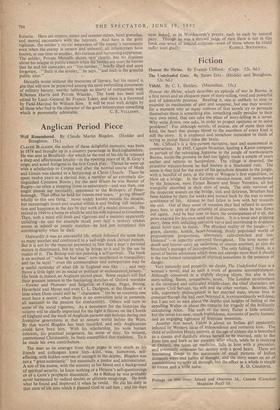Fiction
Honour the Shrhie. By Francis Clifford. (Cape. 12s. 6d.) Videhi. By C. L. Holden. (Macmillan. 15s.)
Honour the Shrine, which describes an episode of war in Burma, is a first novel and an eloquent piece of story-telling, vivid and powerful and of admirable promise. Reading it, one is unlikely to stop to examine its mechanism of plot and suspense, but one may wonder for a moment why so many authors of first novels try to persuade themselves there is something else, something really peculiar to their very own mind, that can take the place of story-telling in a novel. Why write fiction, one asks, in order to project opinions or to solve problems? For although novels, of cout se, are of more than one kind, the heart that pumps blood to the members of every kind is still the story. It is irrational and somehow immodest to think of trying to pump blood from the brain.
Mr. Clifford's is a first-person narrative, taut and economical in construction. In 1945, Captain Strachan, leading a Karen company in pursuit of the retreating Japanese in thd jungle of north-eastern Burma, keeps the promise he had too lightly made a couple of years earlier and returns to Sampralam. The village is deserted, the primitive mission-house he had known is a blackened ruin. The scene is thus laid for the story of his parachute descent in the jungle, with a handful of men, at the time of Wingate's first expedition, to blow up a bridge. In the Catholic mission-house, still unmolested by the Japanese, were Father Bassett and Sister Veronica; all but tranquilly absorbed in their cure of souls. The only survivor of the desperate assault on the bridge, sick and delirious, Strachan had been hidden by them for weeks and nursed back by the nun to some semblance of life. Almost he had fallen in love with her towards the end. Out of their sense of vocation they had refused to accom- pany him, in spite of the certainty of discovery, when he was flown out again. And he had now to learn the consequences of it all, the price exacted for his own need and theirs. It is a tense and gripping story, done with unfailing narrative verve and convincing in dramatic detail from start to finish. The physical reality of the jungle—' `a green, clammy, hostile, heart-breaking, thinly populated world of preposterous proportions, alternately rain-drenched and sun- blistered"—is superbly conveyed throughout. The terse scenes of death and horror carry an undertone of sincere emotion, as also do Strachan's passages of introspection. The only failing, I think, in a novel of heroic adventure which does not attempt more than it should is the too honest reiteration of physical sensations in the presence of danger. Very naturally and properly, no doubt, The Undefended Gate is a woman's novel, and as such a work of genuine accomplishment. Although conceived in a slightly cloying idiom, this also is live story-telling, fluent, sympathetic, acute. The London environment is the moneyed and cultivated middle-class; the chief characters are a senior Civil Servant, his wife and the other woman. Beatrice, the wife, supremely philosophical in her married state, whose love is constant though she had once betrayed it, is extraordinarily well done, but I am not so sure about the depths and heights of feeling of the appalling Walter or about the capacity for tragedy of the brilliantly calculating Alice. The ends of the story flutter a little untidily, but the novel has ease, much truthfulness, moments of pretty humour and an engaging lightness of feminine invention. Another first novel, Videhi is -about an Indian girl apparently infected by Western ideas of independence and romantic love. The child of orthodox Hindu parents, at the age of sixteen she is betrothed to a cousin and dutifully allows herself to be married, only to flee from him and back to her parents; after which, while he is studying at Oxford, she takes up medicine, falls in love with a journalist, and eventually embraces her destiny with a good heart. There are interesting things in the succession of small pictures of Indian domestic ways and habits of thought, and the story wears an air of conscientious veracity all through, but the effect as a whole is simple


















































 Previous page
Previous page